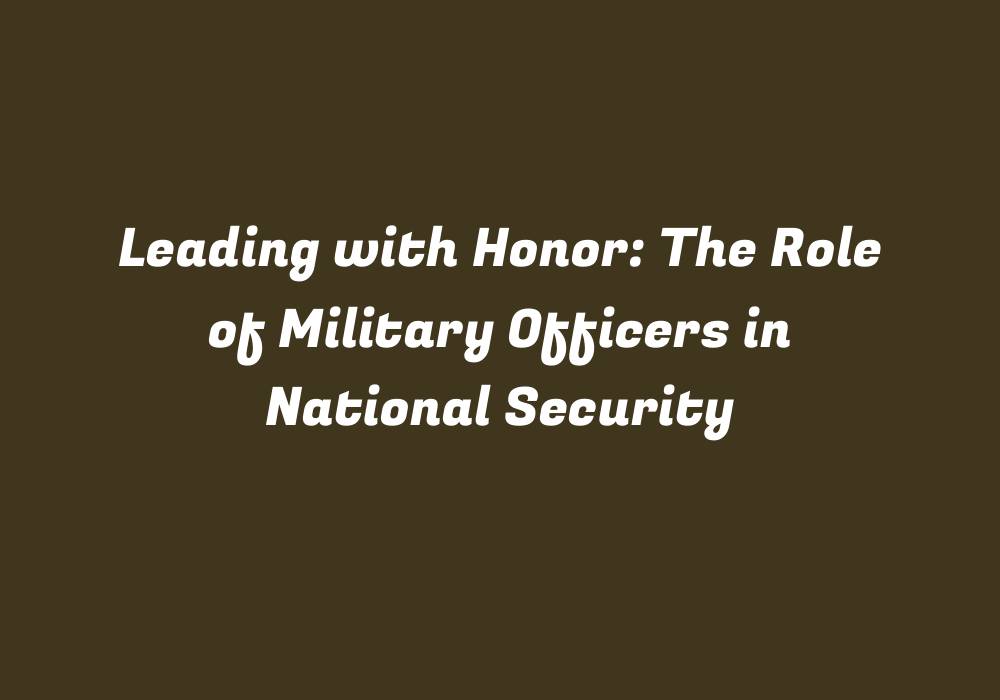Introduction
Military officers serve a vital role in maintaining national security, but their leadership also carries significant weight within the realm of honor and integrity. The concept of leading with honor encapsulates not just the duty to protect and uphold their country’s interests but also the responsibility for preserving the ethical foundations upon which they operate as individuals and members of an institution.
The Importance of Honor
Honor, in its essence, is the embodiment of a set of values and principles that define a person’s moral compass. It is a code to live by, ensuring that one’s actions are not only aligned with their own ethical framework but also demonstrate respect for others within their community. The military environment has traditionally placed a high emphasis on honor, as it fosters trust and commitment among personnel in a context where decisions can have grave consequences.
Military officers must understand the significance of their roles in shaping the culture and practices within their units. By emphasizing honor, they are able to create an atmosphere that encourages respect, teamwork, and adherence to ethical principles. This foundation becomes crucial as these leaders take on greater responsibilities in formulating national security strategies and managing complex operational environments.
Leadership Principles
Several leadership principles have been adopted by military institutions that underscore the importance of honor and integrity, including:
1. **Accountability:** As leaders, officers must hold themselves and their subordinates responsible for their actions and decisions. This mindset ensures that they take ownership of any mistakes or shortcomings while fostering an environment where everyone is expected to contribute positively to the team’s objectives.
2. **Decision Making Under Pressure:** Military leaders are often faced with critical decisions in high-stress situations, requiring them to be well-versed in making sound judgments under pressure. By maintaining their focus on honor and ethical considerations, officers can make choices that not only prioritize the safety and well-being of their personnel but also preserve the integrity of their unit and the nation they represent.
3. **Emotional Intelligence:** Effective leadership demands emotional intelligence, which enables officers to understand and regulate their emotions while recognizing the feelings of others. By fostering a sense of empathy and respect for diverse viewpoints, leaders can create a more cohesive team that is better equipped to address complex challenges in the national security realm.
4. **Continuous Professional Development:** Leading with honor requires an ongoing commitment to personal growth and improvement. Through continued education and professional development opportunities, officers can enhance their abilities as leaders while also demonstrating their dedication to excellence within their roles. This mindset fosters a culture of learning and innovation that benefits not only the individual but also the entire military organization.
5. **Courage:** Courage is an essential component of honor, as it involves the ability to face fear, adversity, and uncertainty with resilience and determination. By exhibiting courage in both personal and professional situations, officers can inspire those around them to persevere during difficult times while also ensuring that the ethical foundations upon which they lead are never compromised.
Conclusion
The role of military officers in preserving national security is complex, demanding a balance between strategic decision-making and adherence to honorable principles. By leading with integrity, these leaders can forge a strong foundation upon which their personnel can thrive and contribute to the protection of their country’s interests. As the world becomes increasingly interconnected and the landscape of national security evolves, it is essential that military officers continue to uphold the values of honor, accountability, emotional intelligence, continuous professional development, and courage. By doing so, they will not only safeguard their nation but also ensure a legacy built on respect for both themselves and those they serve.
